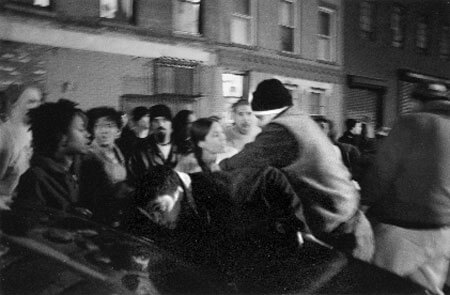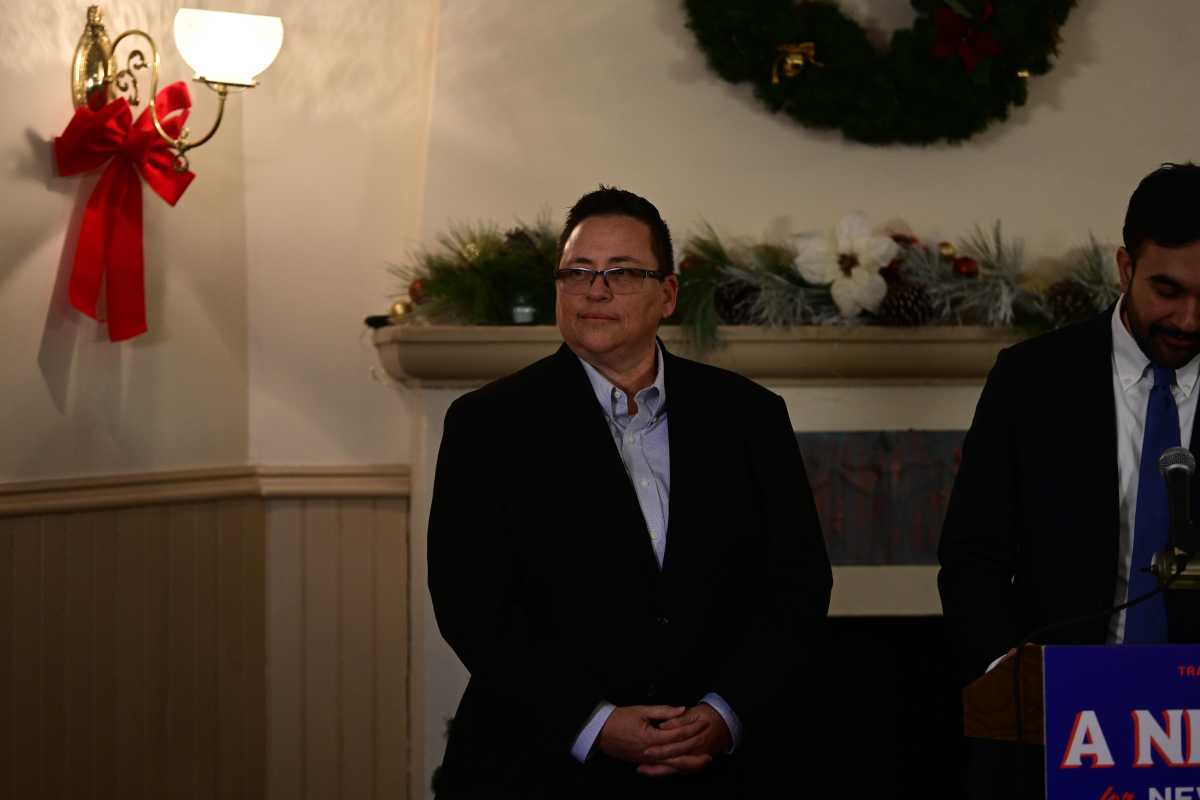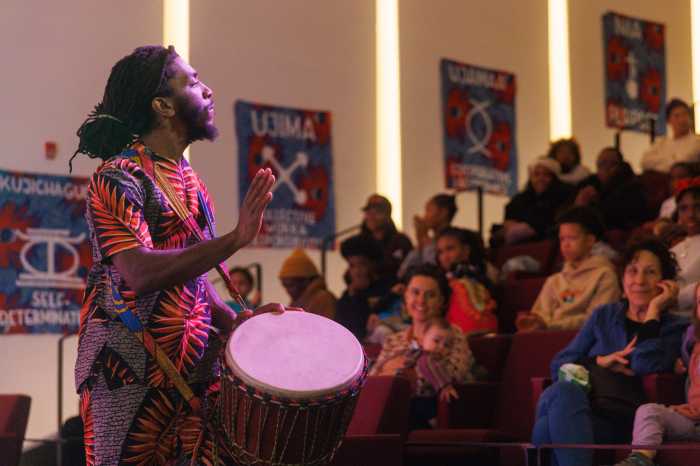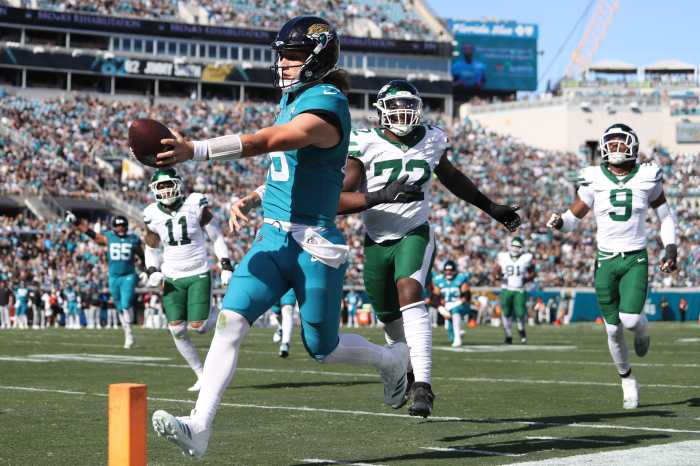Charges of homophobia emerge from people of color arrests at prison reform fundraiser
>CRACKDOWN Rickke Mananzala being handcuffed by a plainclothes police officer.
As law enforcement scrutiny of protest groups is increasing nationwide, some Brooklyn activists are charging that the police beat and harassed them outside a party early in the morning on November 16. They charged that some of the police action was homophobic in nature.
“They particularly targeted people with cameras,” said Mayuran Tiruchelvam, an organizer for Anarchist People of Color, at a November 17 press conference. “They particularly targeted people who were visibly queer, women of color. Anybody who asked questions, anybody who they said was in the way, they hit.”
The incident took place at 968 Atlantic Avenue in the Prospect Heights section of Brooklyn. In the police version of the events, three police officers saw a partygoer drinking a beer on the sidewalk outside the building. When the officers stopped to issue a summons, the partygoer objected and other people at the party, which was raising funds for Critical Resistance, a prison reform group, came out to the street.
“They called for back up once they saw that people were coming outside,” Tiruchelvam said during a November 17 interview on radio station WBAI. “They apparently called for back up and within seconds there were over 20 marked vehicles as well as unmarked police vehicles on the scene,” he said at the press conference. Tiruchelvam’s claim that additional police officers arrived “within seconds” suggests that they were waiting nearby.
Another person speaking at the press conference said it took the additional police officers “minutes” to arrive on the scene, which suggests that they were elsewhere on routine patrol. Apparently a melee ensued and, ultimately, police arrested eight people. Activists are charging that the police used excessive force.
“Many of us bear the marks of the NYPD’s courtesy, professionalism, and respect,” said Rafael Mutis, 42, who was arrested that night.
In a second version voiced by the activists, the dispute started when three police officers entered the building where the party was taking place and demanded a list of those attending the event. The party included anarchists as well as members of Critical Resistance. Activists charged that police were monitoring the groups and that police never mentioned issuing a summons for public drinking.
“They never told us that specifically,” Tiruchelvam said on WBAI.
One of those arrested charged the police were abusive at the 77th Precinct, where the arrests were processed.
“They were questioning my gender,” said Rickke Mananzala, 24, who was arrested. “I experienced severe verbal harassment by the cops based on my gender identity and my identity as a transgendered person.”
Also arrested were Lionel Ouellette, 29, Piper Anderson, 23, Jimmy Aponte, 23, Jonathan Wilson, 25, Christian Moran, 27, and David Gallardo, 26. All eight are facing multiple misdemeanor charges.
At the press conference, Imani Henry, a queer activist and artist, objected to the police behavior.
“We see what happened this weekend as a wholesale gay bashing of LGBT youth of color by the police,” said Henry who was not at the party. “This is an outrage. We are not going to stand for this. This racist, homophobic, sexist police brutality must stop.”
Police said they were simply issuing a summons and called for assistance when the crowd grew hostile.
“It started out as a quality of life matter,” said Inspector Michael Coan of the police department press office.
The beer drinker refused to produce identification and when he “began to incite the crowd,” estimated at 100 by the partygoers, the officers needed help, according to Coan. He rejected the charges of brutality, harassment, and spying.

“Not only are we not going to discriminate based upon race, ethnicity, and sexual orientation, we’re not going to monitor a group and then swoop in and arrest them,” Coan said.
He said two officers had minor injuries and that there was no evidence the officers had entered the building. Additionally, no taxpayer had complained about police behavior that night.
“There were no allegations made to our Internal Affairs Bureau,” Coan said. “There were no complaints to the Civilian Complaint Review Board. We take any such allegations seriously and if such allegations were made we would investigate them.”
Coan also said that a crowd went to the precinct after the arrests and someone painted “77th Precinct State Sponsored Terror” on the side of the police station.
The sensitivity of the activists is predictable given recent revelations about law enforcement monitoring of groups that are exercising their First Amendment rights.
A November 12 story in The New York Times reported that “police are monitoring the Internet and the organizing groups” that will be coming to protest at the Republican Convention that will be held next year in New York City.
A November 23 Times story reported that the Federal Bureau of Investigation has been monitoring and collecting information on peaceful protests across the country.
Anonymous FBI officials told The Times “the intelligence-gathering effort was aimed at identifying anarchists and ‘extremist elements’ plotting violence, not at monitoring the political speech of law-abiding protesters.”
The story added that an FBI memo on the monitoring “appears to offer the first corroboration of a coordinated, nationwide effort to collect intelligence regarding demonstrations.”
Both the FBI and the New York City police department have long histories of monitoring political groups. Until recently, both agencies had restrictions on their ability to engage in this type of spying. The Brooklyn activists believe they have been watched.
“This isn’t isolated,” said Kai Lumumba Barrow at the November 17 press conference. “We have had constant surveillance, harassment, and now brutality and violence in our neighborhood.”
We also publish:



































